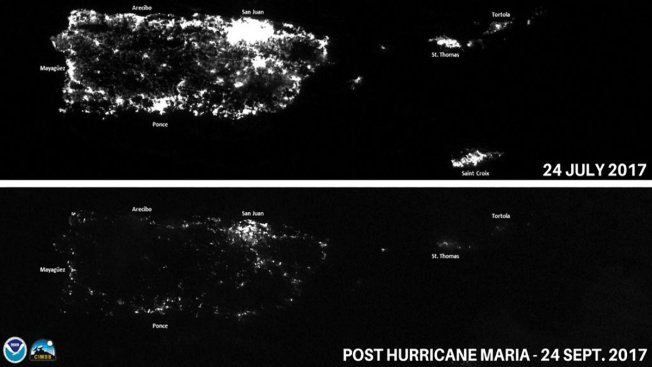Privatizing
Power
 Critics on Monday called Puerto
Rican Governor Ricardo Rossello's plan to privatize the island's electricity
authority a development that exemplifies the prevalence of "disaster
capitalism"—the liberalization and corporatization of economies following
destructive events like last September's Hurricane
Maria, which devastated the island.
Critics on Monday called Puerto
Rican Governor Ricardo Rossello's plan to privatize the island's electricity
authority a development that exemplifies the prevalence of "disaster
capitalism"—the liberalization and corporatization of economies following
destructive events like last September's Hurricane
Maria, which devastated the island.
Wenonah Hauter of Food & Water
Watch called the
decision "catastrophic" and indicative of the same pattern of the
Trump administration prioritizing wealthy companies that aim to take over
public services.
"The decision to privatize
Puerto Rico's state-owned power company follows the same dangerous path mapped
out in the Trump administration's draft infrastructure plan," said Hauter.
"Whether it's water or energy, privatization helps Wall Street at the expense of the wellbeing and health of communities, particularly low-income families and people of color."
"Whether it's water or energy, privatization helps Wall Street at the expense of the wellbeing and health of communities, particularly low-income families and people of color."
Naomi Klein, who has written extensively about the phenomenon of disaster capitalism, said on Twitter that the decision is troubling but unsurprising.
Intercept reporter Kate Aronoff agreed that the destruction
caused by last year's hurricane has provided Rossello with an opportunity to
sell the Puerto Rico Electric Power Authority's (PREPA) assets to various
private companies, allowing them to operate without the regulatory oversight
used for public entities.
Four months after the hurricane,
about 30 percent of the island is still without power. In addition to gross mismanagement by the Trump
administration, PREPA has also been blamed for the slow recovery.
In November, the agency's director was forced to resign due to failures that included a short-lived rebuilding contract that was given to a tiny Montana-based energy company with connections to Interior Secretary Ryan Zinke.
In November, the agency's director was forced to resign due to failures that included a short-lived rebuilding contract that was given to a tiny Montana-based energy company with connections to Interior Secretary Ryan Zinke.
Utility workers also accused the
government of hoarding supplies needed for the recovery, and union officials have
argued that PREPA has intentionally sabotaged efforts to repair the electric grid in order to pave
the way to privatization.
Rossello argued on Monday that PREPA
has become "a heavy burden for our people, who today are held hostage by
its poor service and high cost," referring to Puerto Rico's frequent
blackouts even before Hurricane Maria and Puerto Ricans' power bills, which on
average are twice as high as those on the mainland.
"The deficient and obsolete
system of generation and distribution of energy is one of the great impediments
to our economic development," Rossello added.
But critics including Sen. Juan
Dalmau of the Puerto Rican Independence Party argued that privatization would
likely hold few benefits for customers and argued that the territory's leaders
were taking advantage of residents' desperation for any improvement after the
devastating storm.
"The message is a manipulation
of the justified hopelessness of an island facing a lack of power after the
hurricane," Dalmau said.
Instead of privatizing and
deregulating the island's energy system, Hauter argues the Puerto Rico
government has much better options.
"A just and equitable
infrastructure plan would dedicate funding for water systems, have a
progressive revenue stream, and prioritize vulnerable communities with the
greatest affordability and public health needs like Puerto Rico," she
said. "This plan does none of this."